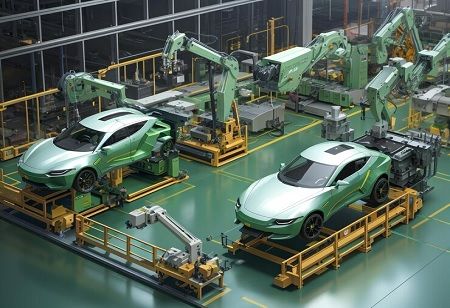
Tesla and Reliance Eye Joint Venture for EV Production in India

 Tesla is reportedly exploring options for establishing its presence in India, with discussions underway for a potential collaboration with Reliance Industries. The American electric vehicle powerhouse is contemplating a joint venture agreement to set up a manufacturing plant in the country, according to sources.
Tesla is reportedly exploring options for establishing its presence in India, with discussions underway for a potential collaboration with Reliance Industries. The American electric vehicle powerhouse is contemplating a joint venture agreement to set up a manufacturing plant in the country, according to sources.
According to recent reports, Tesla has allocated $2 billion for its upcoming ventures in India and has been actively exploring potential locations for its plant, including Gujarat and Maharashtra. The report suggests that Maharashtra is emerging as the preferred choice for the company's operations in the country.
During an X (formerly Twitter) Spaces session alongside Nicolai Tangen, CEO of Norges Bank Investment Management, Elon Musk, CEO of Tesla, confirmed Tesla's entry into India. "India is now the most populous country in the world. India should have electric cars just like every other country has electric cars. It's a natural progression to provide Tesla electric vehicles in India", he said.
Senior executives from Tesla are anticipated to make a visit to India within the next month to conclude the selection of a site for their plant and to formalize a potential joint venture with RIL. However, as per reports, these discussions with RIL are not exclusive, leaving room for Tesla to consider alternative domestic partners if ongoing negotiations do not come to fruition.
In March, the Indian government greenlit an Electric Vehicle (EV) policy with the goal of positioning the country as a prominent global manufacturing hub for EVs. The policy stipulated a minimum investment of Rs 4,150 crore while leaving no upper limit in a bid to draw investments from renowned international EV manufacturers.
Alongside the mandatory investment threshold of Rs 4,150 crore ($500 million), the policy also outlined a strict timeline of three years for setting up manufacturing units in India, initiating the commercial production of EVs, and attaining a minimum of 50 percent domestic value addition (DVA) within a maximum span of five years.
Moreover, the policy delineated that the duty imposed on the total quantity of EVs eligible for import would be limited to the investment made or Rs 6,484 crore (equivalent to incentives provided under the PLI scheme), whichever is less. Additionally, it outlined that up to 40,000 EVs, with an annual ceiling of no more than 8,000 vehicles, could be imported if the investment surpasses $800 million. Furthermore, any unused annual import quotas could be carried forward for subsequent use.